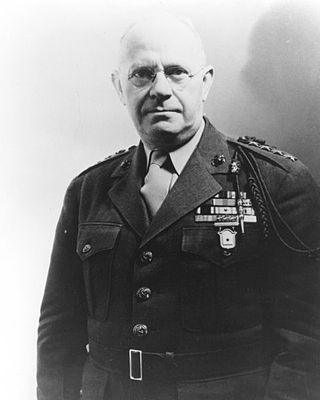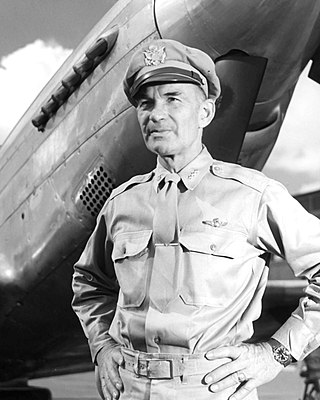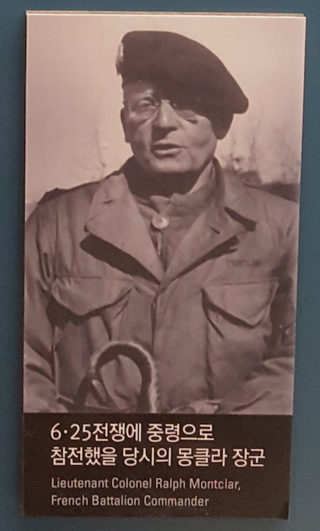
Évariste Galois was a French mathematician and political activist. While still in his teens, he was able to determine a necessary and sufficient condition for a polynomial to be solvable by radicals, thereby solving a problem that had been open for 350 years. His work laid the foundations for Galois theory and group theory, two major branches of abstract algebra.
Commandant is a title often given to the officer in charge of a military training establishment or academy. This usage is common in English-speaking nations. In some countries it may be a military or police rank. It is also often used to refer to the commander of a military prison or prison camp.

The Forgotten Soldier (1965), originally published in French as Le soldat oublié, is an account by Guy Sajer of his experiences as a German soldier on the Eastern Front during World War II. With reference to the author's ambiguous relationship to war, the book has been called "the account of a disastrous love affair with war and with the army that, of all modern armies, most loved war", being written with the "admiration of a semi-outsider". The English edition was translated by Lily Emmet.

Bruno Jean Marie Cremer was a French actor best known for portraying Jules Maigret on French television, from 1991 to 2005.

John Henry Russell Jr. was a major general and 16th Commandant of the Marine Corps.

General Thomas Holcomb was a United States Marine Corps officer who served as the seventeenth Commandant of the Marine Corps from 1936 to 1943. He was the first Marine to achieve the rank of general, and was a strong supporter of racial segregation in the Marine Corps. After retiring from the Marine Corps, Holcomb served as the U.S. Envoy Extraordinary and Minister Plenipotentiary to South Africa from 1944 to 1948. One of his ancestors was Joshua Barney, a naval hero of the War of 1812.

Is Paris Burning? is a 1966 black-and-white epic war film about the liberation of Paris in August 1944 by the French Resistance and the Free French Forces during World War II. A French-American co-production, it was directed by French filmmaker René Clément, with a screenplay by Gore Vidal, Francis Ford Coppola, Jean Aurenche, Pierre Bost and Claude Brulé, adapted from the 1965 book of the same title by Larry Collins and Dominique Lapierre. The film stars an international ensemble cast that includes French, American and German stars.

Air Vice Marshal Amyas Eden Borton, was a pilot and commander in the Royal Flying Corps during the First World War and a senior commander in the Royal Air Force during the 1920s. He saw active service on the Western Front, in Palestine and in Iraq. In the latter part of his career, Borton was the second Commandant of the RAF College at Cranwell before becoming the Air Officer Commanding RAF Inland Area.

Millard Fillmore Harmon Jr. was a lieutenant general in the United States Army Air Forces during the Pacific campaign in World War II. He was presumed to have perished in February 1945 on a flight when the plane carrying him disappeared in transit.

Raoul Charles Magrin-Vernerey, also known as Ralph Monclar was a French officer and 2nd Inspector of the Foreign Legion who fought in World War I, World War II within the ranks of the Free French Forces and led the French Battalion in the Korean War. He was also one of the first senior officers to respond to the Appeal of 18 June.

Henry Martyn Lazelle was a career officer in the United States Army. In addition to serving during the American Civil War and Indian Wars, he was Commandant of Cadets at the United States Military Academy from 1879 to 1882.
Lieutenant-Colonel Peter Bonnevaux was the fourth Military Governor of British Ceylon and third General Officer Commanding, Ceylon. A French national, Bonnevaux was watchermaker at the Palace of Versailles before leaving for England to escape Protestant prosecution in 1765. Having joined the East India Company's Madras Army, Bonnevaux rose to the rank of lieutenant-colonel in the 10th Madras Native Infantry.
The 1907 Birthday Honours for the British Empire were announced on 28 June, to celebrate the birthday of Edward VII.
The 1908 Birthday Honours for the British Empire were announced on 28 June, to celebrate the birthday of Edward VII.
The 1909 Birthday Honours for the British Empire were announced on 28 June, to celebrate the birthday of Edward VII.
The 1913 Birthday Honours were appointments in the British Empire of King George V to various orders and honours to reward and highlight good works by citizens. The appointments were made to celebrate the official birthday of The King, and were published on 3 June 1913 and 6 June 1913.
The King's Birthday Honours 1923 were appointments in many of the Commonwealth realms of King George V to various orders and honours to reward and highlight good works by citizens of those countries. The appointments were made to celebrate the official birthday of The King. They were published on 1 and 29 June 1923.
The New Year Honours 1914 were appointments by King George V to various orders and honours to reward and highlight good works by members of the British Empire. They were announced on 2 January 1914.
René Lennuyeux (1904–1990) was a Général de division of the French Army and Commandant of the French Foreign Legion from 1955 to 1958.

Pierre Jean Joseph Jeanningros was a French général, famous for having commanded the French Foreign Legion.











